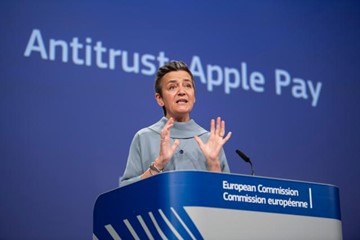Apple reaches final agreement with the European Commission

After several years of proceedings, the European Commission has finally officially accepted Apple's commitments to open up NFC technology to competition and developers. The measures imposed are numerous and aim to guarantee fair competition between the digital wallets that will arrive on iPhones. Apple avoids a heavy penalty, but could well lose market share in Europe over the coming months.
FACTS
- The European Commission has finally accepted Apple's commitments to open up NFC technology on the brand's cell phones.
- As a reminder, Apple had total control over iOS, the operating system for iPhones. Until now, the company had retained all functionalities linked to their NFC (Near Field Communication) chip, notably those linked to mobile wallets for payments.
- After investigation and accusations of abuse of a dominant position by the Commission, Apple finally accepted the obligations imposed:
- Provide free access to NFC technology on iOS devices;
- Allow access to HCE (Host Card Emulation) mode without using Apple Pay or Apple Wallet;
- Enable users to choose a default wallet easily and in just a few clicks, while still having access to authentication (Face-ID, etc.) and access tools (Double-click and Field Detect,) ;
- Explicitly authorize the use of HCE mode with alternative functionalities or alternative ways of using NFC technology;
- Remove constraints on developers, such as licensing requirements;
- Continue to upgrade the HCE architecture according to standards and needs;
- Do not prevent developers from encouraging users to change their default NFC settings.
- Apple has a number of other technical obligations which also relate to NFC chips and competition.
- Apple's commitments have been signed for 10 years. During this period, Apple will appoint a trustee to monitor compliance with the commitments. The agreement is valid throughout the European Economic Area (EEA).
CHALLENGES
- Avoiding a heavy fine: As a reminder, the American firm risked a fine of up to 10% of its annual worldwide sales, representing around $40 billion.
- A new market: With the signature of the agreement on the commitments to be respected, the European Commission is opening up a new market for European players in wallets and mobile payments. This opening up should also encourage innovation in the field, something that seemed to be complicated in the face of giants such as Apple, Samsung and Google.
- A competitor already identified: The European Commission's accusation that Apple is anti-competitive opens up new possibilities for fintechs. One player has already understood this, presenting its alternative to Apple Pay over a month ago. The British fintech, Curve, is aiming to make its Curve Pay solution the first competitor to the American brand's wallet.
- A financial advantage for banks: Card issuers should also benefit from this opening up to competition. Indeed, while consumers lose nothing by using Apple Pay, issuing banks pay fees to be available in the American firm's service. One of the choices of incoming competitors could be a reduction in the prices linked to this use, which would favor banking institutions.
MARKET PERSPECTIVE
-
In May 2022, after a two-year investigation into Apple's anti-competitive practices, the European Commission formally accused the American company of abusing its dominant position in the mobile wallet market.
-
Faced with the risk of sanctions, Apple announced last December that it would allow NFC technology to be opened up to competition. Following this, the European Commission announced a consultation with competitors and developers to determine the terms of Apple's obligations. The Commission's decision puts an end to this procrastination.
-
Today, the company is trying to distance itself from a competition that has become inevitable. A month ago, Apple announced the arrival of an improved Pay Later functionality, to enable it to offer its services beyond the borders of the United States and thus maintain its added value in the face of new entrants.
